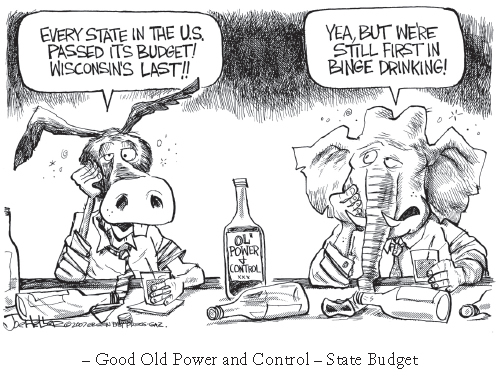 I will never forget the late-night budget standoff in 2003, shortly after my second oath of office, in the Wisconsin state legislature. My committee appointments were as the chair of the Economic Development Committee and vice chair for a second term in office on the House Judiciary Committee.
I will never forget the late-night budget standoff in 2003, shortly after my second oath of office, in the Wisconsin state legislature. My committee appointments were as the chair of the Economic Development Committee and vice chair for a second term in office on the House Judiciary Committee.
The “budget crisis,” as it was identified by county after county and municipality after municipality, was caused by a ripple effect from state unfunded mandates, escalating costs of health insurance, and poor collaboration and planning between local, county and state government.
State budgets are always in crisis in Wisconsin in that we make budget decisions based on getting our majorities back in office. The ripple effect is the pork stuffed into legislation that was promised by the front-row leaders in setting the house legislative agendas.
Notice I did not mention “public policy agendas”—there is little of that.
The power for setting the agenda and moving the legislation to be voted on rests in the hands of the house assembly speaker. Any checks and balances thereafter are in the hands of the governor’s line-item veto.
Without a need to have money in the budget before you spend it, or “pay as you go,” you may as well give an open checkbook to a teenager at holiday time. And therein lies the problem: there is no accountability for state-level spending if the political will is stronger than the public policy will. It’s truly a case of “Who is watching the hen house?”
One vivid recollection I have of this front row versus back row dynamic happened during the 2003/2004 budget debate.
The conservative arm of our GOP party had done the math, and the current tax levels in no way could afford the massive giveaway programs that were being carved out by the front row in the Republican leadership ranks. It was 1:00 a.m., and both political party front-row benches were meeting privately behind the scenes to work out a “deal,” as their private discussions were so often called.
The body, as a whole, had very little idea of what was happening in these private meetings. That’s not to say they weren’t paying attention. It’s that the front row plays a “leadership game” that gives off an illusion of power that few feel able—or willing—to criticize or challenge.
A first-year legislator on my side of the aisle was glued to the discussion in the front of the chamber at 1:30 a.m. Her eyes were wide open, almost in a state of desperation, despite the late hour. I asked, “Are you all right? It’s late. Do you need to lie down on one of the couches in the back and get called to take your votes?”
The freshman legislator said, “Absolutely not. I have to keep an eye on them in the front so that I can make sure they don’t do something stupid.”
She was right. The deals worked out with the front rows of both political parties were not provided to committees for consideration and public scrutiny. The real deals happening in the budget were based on a couple of…To continue reading this book, get your copy of “What Sex is a Republican” in paperback or Kindle edition on Amazon.



